CRM Managers: Roles, Skills, Salary, and Best Practices

A CRM manager plays a crucial role in maintaining positive customer relationships and ensuring customer satisfaction. This article revolves around the responsibilities, skills, and salary of a CRM manager, as well as the differences between a CRM manager and a CRM coordinator. Learn about the importance of equipping your CRM manager with the right tools and explore the benefits of integrating a CRM manager into your customer support strategy.
What is a Customer Relations Manager?

A manager of customer relations plays a pivotal role in an organization. They are responsible for managing the CRM process, which involves developing and maintaining positive relationships with customers. This role of a CRM manager is crucial in ensuring customer satisfaction, loyalty, and retention. A customer relationship manager oversees a team of professionals who are tasked with managing customer interactions. They use various tools and strategies to understand customer needs, preferences, and behaviors. These tools can range from sales CRM software, which helps track sales activities and customer interactions, to personal CRM systems that focus on individual customer relationships.
Salary of CRM Manager
According to the latest data from Talent.com, the average salary for a CRM Manager in the United States is around $103,000 per year or $56.07 per hour. This figure is based on data from thousands of job postings and can provide a valuable benchmark for CRM Managers seeking to negotiate a salary or for employers looking to set a competitive rate.
Factors that Influence CRM Manager Salary
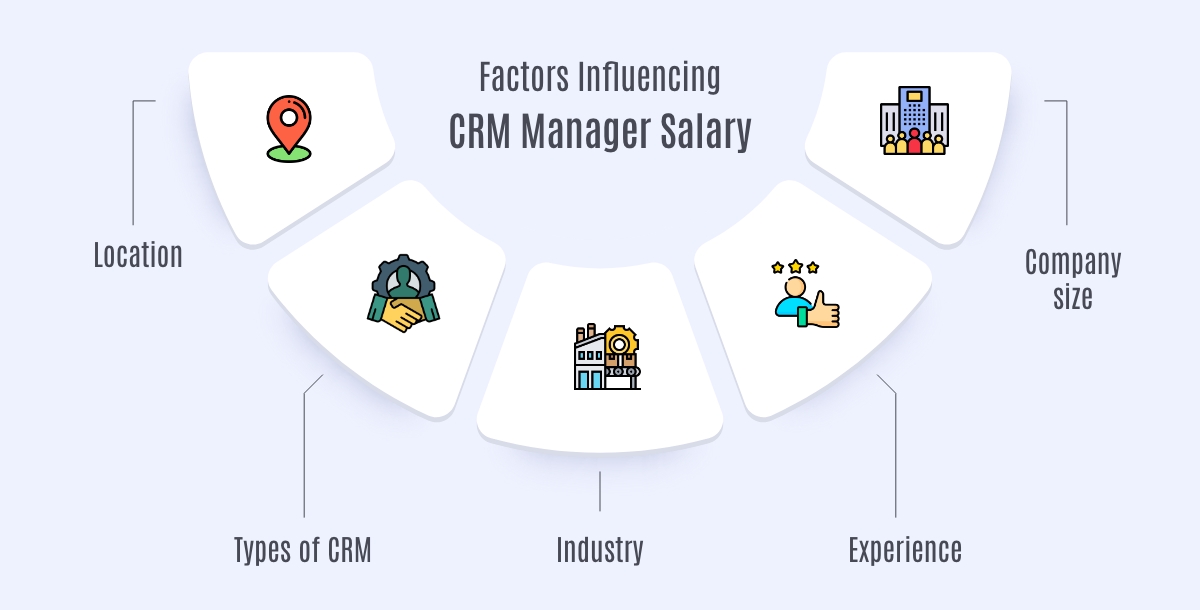
Several factors contribute to the salary of a CRM manager, including:
- Location: CRM managers based in major cities like New York, San Francisco, or Los Angeles tend to earn higher salaries than those in smaller cities or rural areas.
- Proficient in CRM technology: Managers proficient in various types of CRM software, such as Salesforce or Microsoft Dynamics, have an edge. Mastery in multiple types of CRM can lead to higher salaries.
- Industry: CRM managers working in industries like finance, healthcare, or technology often earn higher salaries than those in non-profit or government sectors.
- Experience: More experienced CRM managers typically earn higher salaries, with those with 5-10 years of experience typically earning the highest.
- Company size: CRM managers working for large companies tend to earn higher salaries than those in smaller organizations.
CRM manager vs. CRM coordinator
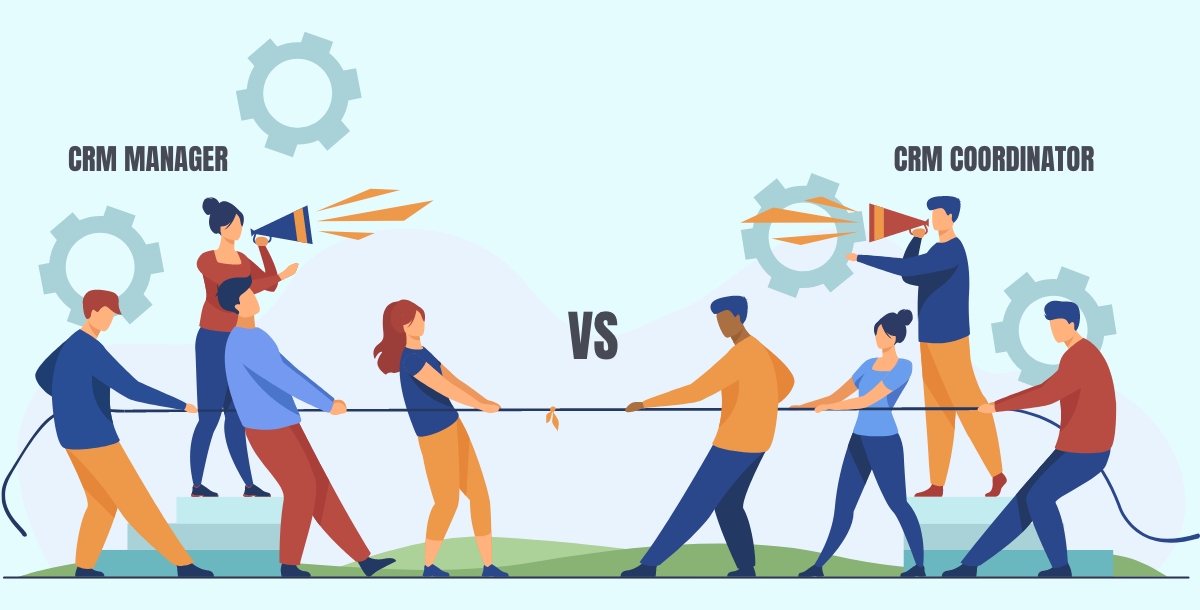
In CRM (Customer Relationship Management), two key roles often emerge: the CRM Manager and the CRM coordinator. Both play crucial roles in managing sales CRM for customer satisfaction. Here are the key differences between these two:
The CRM manager typically holds a more strategic role. They are in charge of managing the entire CRM strategy, ensuring it aligns with the company's broader business objectives. They often work closely with the sales, marketing, and customer service teams to develop and implement effective CRM strategies. This can involve creating CRM databases, selecting and implementing CRM software, and analyzing CRM data to identify trends and opportunities for improvement.
On the other hand, the CRM Coordinator often handles the day-to-day tasks related to CRM. They might be responsible for maintaining the CRM database, ensuring data accuracy, and handling customer inquiries through live chat, help desk software, or AI chatbots. They also often manage the ticketing system, ensuring customer issues are addressed promptly and effectively.
Role of a CRM Manager
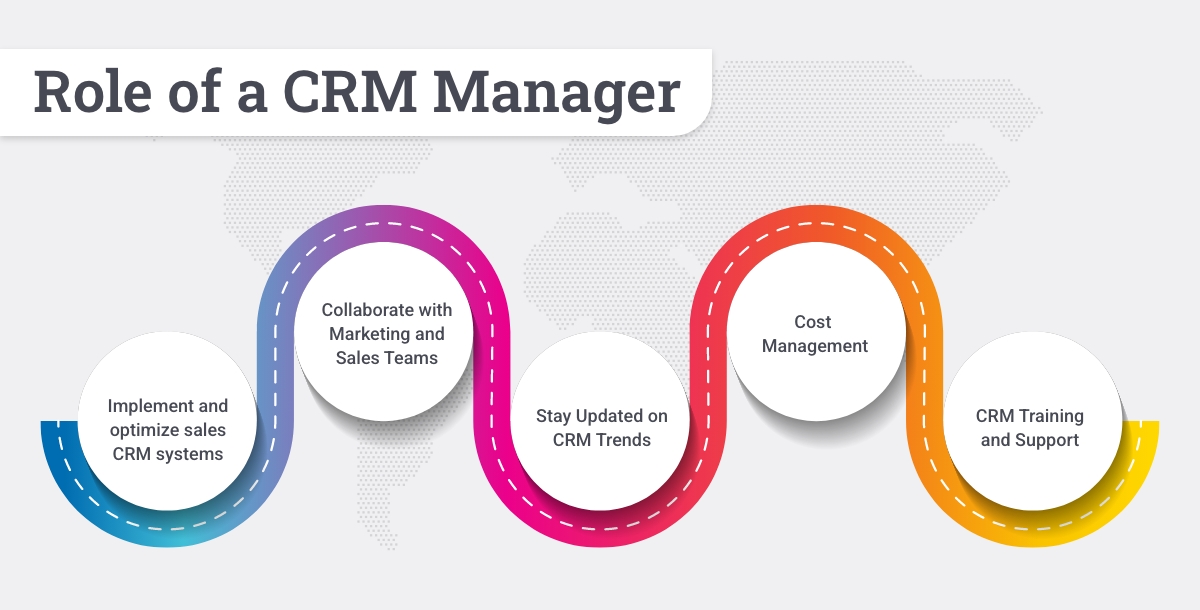
The role of a CRM manager is multifaceted and vital for ensuring the smooth operation and success of customer relationship strategies within a business. Here are the key responsibilities of a CRM manager:
- Implement and optimize sales CRM systems: The CRM Manager is responsible for selecting, implementing, and optimizing sales CRM systems to ensure they meet the business's needs. This involves configuring the CRM to track customer interactions, sales pipelines, and performance metrics effectively.
- Collaborate with Marketing and Sales Teams: Working closely with marketing and sales departments to ensure CRM strategies align with overall business goals, facilitating a unified approach to customer acquisition, retention, and upselling.
- Cost Management: Managing the budget related to CRM systems and technologies, including the cost of software licenses, integrations, custom developments, and ongoing maintenance. Ensuring that investments in CRM technology deliver a positive ROI.
- CRM Training and Support: Providing training and ongoing support to users of the CRM system, live chat, and other related technologies to ensure they are used effectively across the organization.
- Stay Updated on CRM Trends: Keeping abreast of the latest developments in CRM software business solutions, AI chatbot technologies, and customer service trends to ensure the company remains competitive and meets evolving customer expectations.
Skills Required for CRM manager
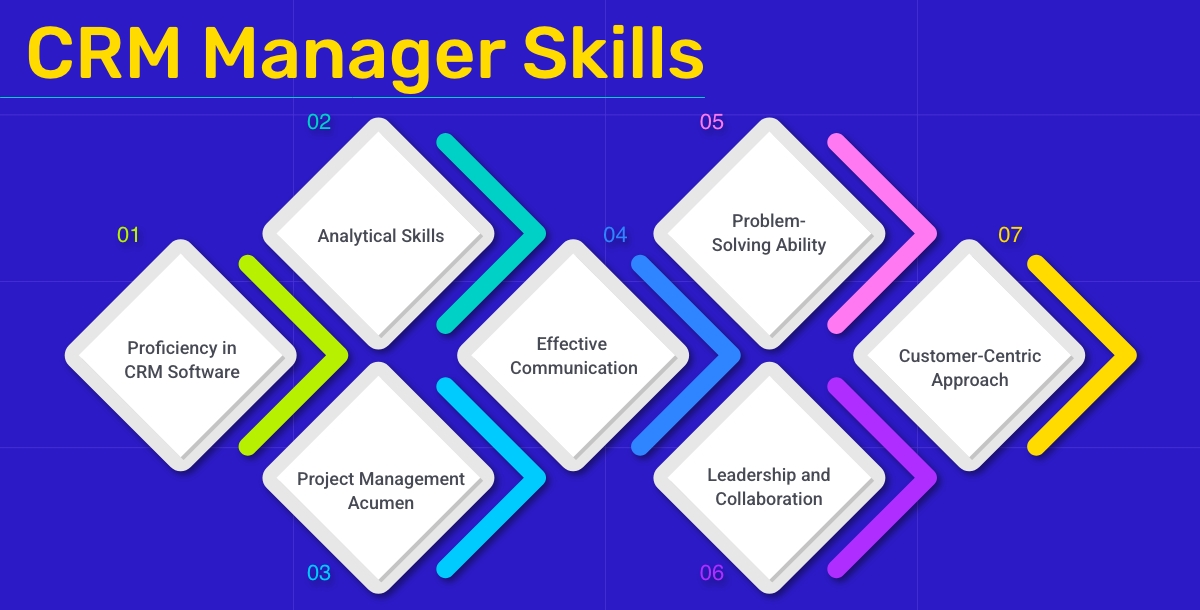
When hiring a CRM manager, identifying candidates with the right mix of technical competencies and soft skills is crucial for ensuring they can effectively manage your company's customer relationship management strategy. Here are some essential skills to look for:
- Proficiency in CRM Software: Candidates should exhibit comprehensive knowledge of CRM platforms, showing capability in customizing and optimizing these systems to meet specific business requirements.
- Analytical Skills: The ability to analyze data from CRM systems to identify trends, measure effectiveness, and derive actionable insights is crucial.
- Project Management Acumen: Strong project management skills are essential for overseeing CRM-related projects, including system implementations and upgrades.
- Effective Communication: Candidates must possess excellent communication skills, useful for explaining CRM strategies, training users, and facilitating cross-departmental collaboration.
- Problem-Solving Ability: It's critical to have the ability to recognize problems and find effective solutions, whether they relate to strategy or CRM system features.
- Leadership and Collaboration: Strong leadership to guide the CRM team and effective collaboration with sales, marketing, customer service, and IT departments ensure a unified customer relationship strategy.
- Customer-Centric Approach: An understanding of customer needs and a dedication to improving customer experiences demonstrate a candidate's customer focus.
Do I Need a CRM Manager for My Customer Support?

If you're considering ways to enhance your customer support and are already utilizing CRM (Customer Relationship Management) software, then integrating a CRM manager into your strategy can be highly beneficial. A CRM manager can oversee and optimize your CRM system, ensuring efficient management of customer data, interactions, and relationships.
By employing a CRM manager, you gain expertise in streamlining your customer support processes. They can enhance your live chat and help desk software by efficiently organizing and managing customer inquiries and responses, ensuring prompt and accurate assistance.
Additionally, a CRM manager can introduce AI chatbot as an effective way to provide immediate responses to common customer queries, reducing response times and enhancing the overall customer experience. These chatbots can be integrated into your live chat and customer service platforms, offering a seamless experience.
The value of a CRM manager also extends to maximizing the potential of your CRM system, including any customer support or help desk features it may offer. They can customize the system to your team's needs, ensuring efficient case management, smooth query resolution, and improved customer satisfaction.
In short, a CRM manager can boost growth and improve customer relationships by optimizing your CRM system and related customer support processes. They ensure your tools work cohesively to deliver an exceptional customer experience.
Equip your CRM Manager with the Right Tools
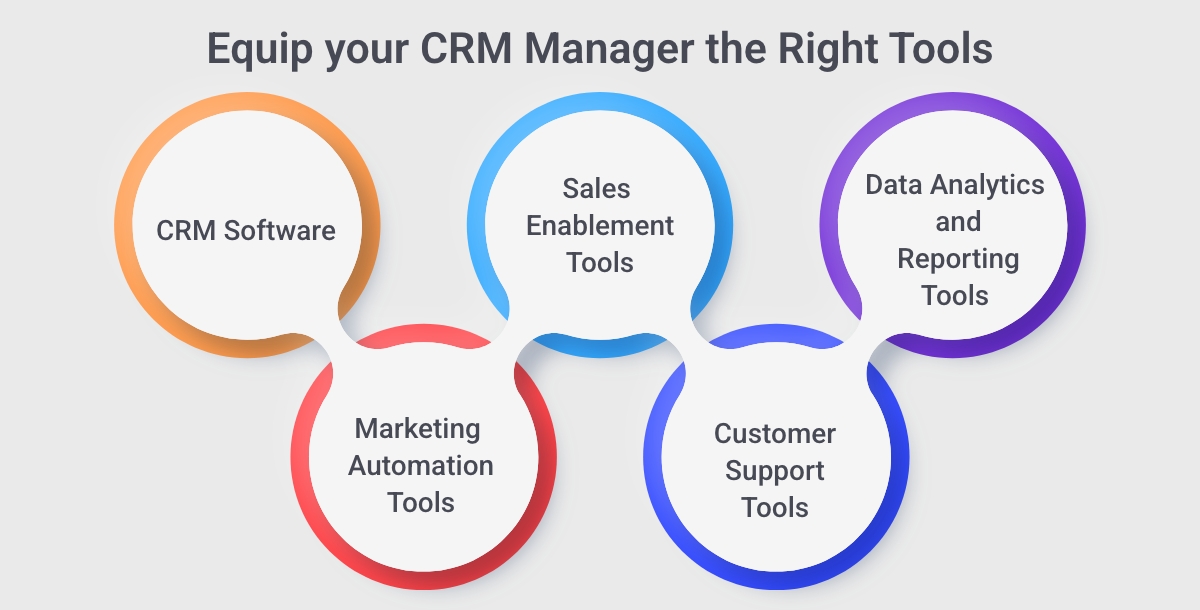
Equipping your CRM manager with a comprehensive toolkit is essential for their success and for maximizing the potential of your CRM system. Here are some key tools and software that will empower your CRM manager to excel:
- CRM Software: Invest in a comprehensive and customizable CRM software that aligns with your business needs and goals. Look for a solution that offers scalability, integration capabilities, and robust reporting and analytics features.
- Marketing Automation Tools: Equip your CRM manager with marketing automation tools to help them manage and execute marketing campaigns more efficiently. This could include email marketing software, social media management tools, or a marketing automation platform.
- Sales Enablement Tools: Provide your CRM manager with sales enablement tools to help them support your sales team and drive revenue growth. This could include a sales CRM, sales intelligence software, or a sales enablement platform.
- Customer Support Tools: Equip your CRM manager with customer support tools, such as live chat, help desk software, or AI chatbots, to help them manage customer support requests more efficiently and improve customer satisfaction.
- Data Analytics and Reporting Tools: Provide your CRM manager with data analytics and reporting tools to help them make data-driven decisions and identify areas for improvement. This could include a business intelligence platform, data visualization software, or a data analytics tool.
Conclusion
Empowering your CRM manager with the right tools and strategies is key to achieving business success and exceptional customer experiences. Through efficient data management, smooth processes, and data-driven information, your CRM manager can improve customer satisfaction and boost growth. Investing in this role demonstrates your commitment to customer excellence. Empower your CRM manager and consider creating your own AI chatbot to continuously enhance your customer support, ensuring your business stays ahead!
Related Articles
- Unleashing the Beauty of Honeysuckle: The Color of Warmth and Joy
- Appy Pie Hackathon: The First Coding Competition to Reward the Most Innovative Ideas
- Why Facebook Debarred a Quiz App?
- 12 Inspiring Examples of Digital Transformation
- Top 10 Content Curation Tools That Superstar Digital Marketers Swear By
- Sales Promotion: Definition, Ideas, and Tips for Running Effective Sales Promotion
- How to Make Money from Blogging: The Complete Guide
- Guess The Unseen: Dynamic 3D Scene Reconstruction from Partial 2D Glimpses
- Famous Logos: Top 10 most famous brand logos
- What Are Sales KPIs & Best KPIs For Sales Examples
